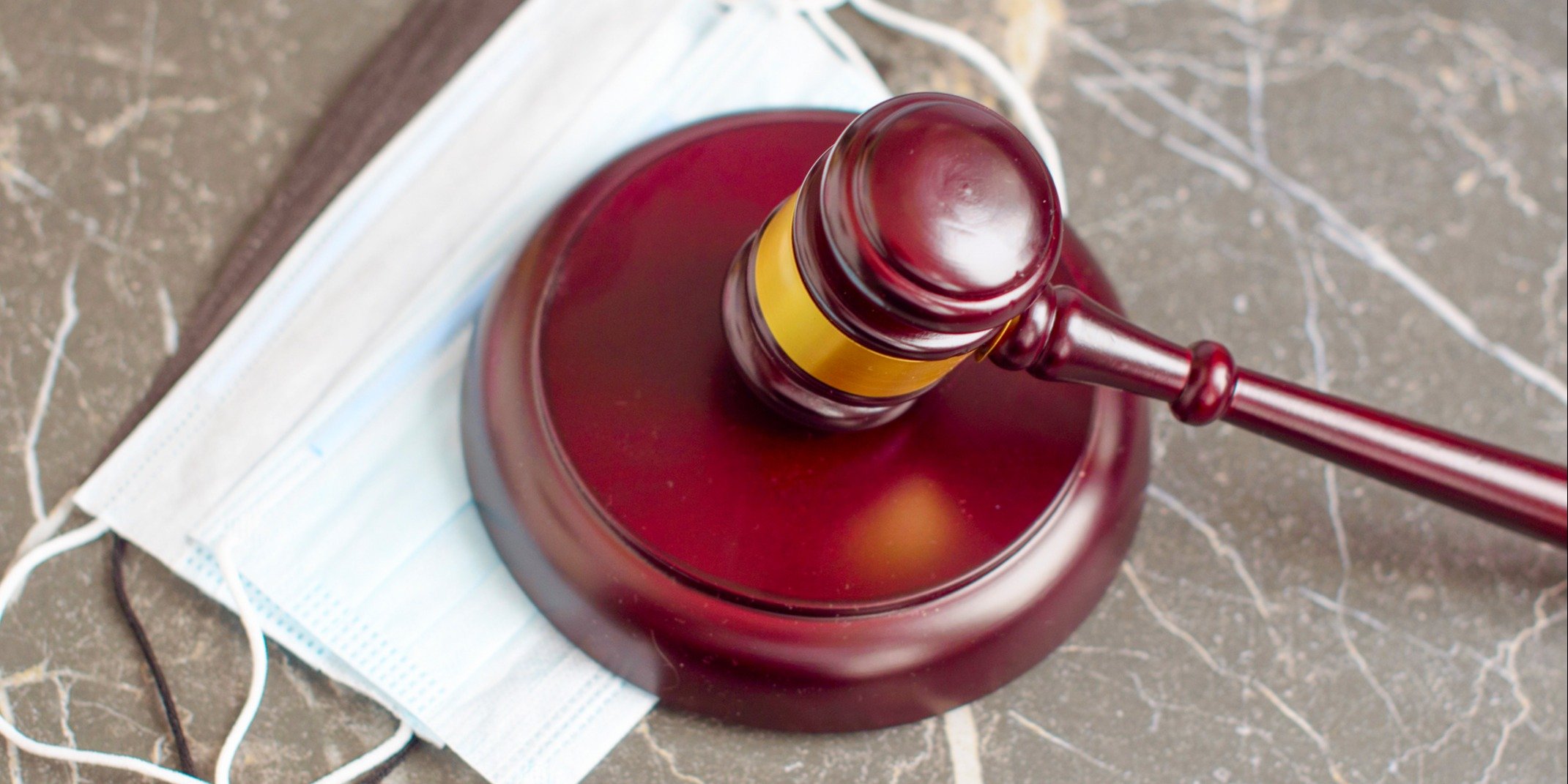Coronavirus-related class action lawsuits will set the bar for future litigation. It’s too early to tell how these cases will unfold, but the decisions will have a widespread impact on how manufacturers go about advertising their products, whether universities must offer students full refunds, and even whether a single country can be held liable for a worldwide pandemic.
Here’s an overview of some of the emerging class action lawsuits regarding the Coronavirus crisis.
David, et al. v. Vi-Jon Inc. d/b/a Germ-X
Plaintiffs
- Geraldine David
- Susan Lara
- Theresa Hass
Defendant
- Vi-Jon Inc. d/b/a Germ-X
What Is the Claim?
There are many hot items flying off shelves thanks to the virus, and hand sanitizers are at the top of the list. Most alcohol-based sanitizers claim that proper use can prevent Flu and Coronavirus. According to the Court House News, Germ-X has stepped up its advertising to use both literature and images to help propagate this message.
The plaintiffs bought Germ-X believing it would prevent them from contracting Coronavirus, but since there are no U.S. Food and Drug Administration (FDA) studies to back up this claim, it is considered a false statement.
Potential Issues for Plaintiffs
The case looks promising for the plaintiffs at the moment. Purell was already warned by the FDA that making false claims will not be overlooked, so the plaintiffs will have this to reference.
Implication for Future Litigation if Plaintiffs Win
If the plaintiffs win, this could open the door for other manufacturers who produce hand sanitizer to face lawsuits as well.
Laddy Curtis Valentine, et al. v. Bryan Collier, et al.
Plaintiffs
- Laddy Curtis Valentine
- Richard Elvin King
Defendants
- Texas Department of Criminal Justice (TDCJ)
- Bryan Collier, executive director of the TDCJ
- Robert Herrera, the warden of the Wallace Pack Unit
What Is the Claim?
Laddy Valentine and Richard King are inmates at the Wallace Pack Unit in Texas. Top Class Actions reports that both individuals claim the Texas Department of Criminal Justice is not taking appropriate measures to help prevent the spread of COVID-19 through the prison.
Some of their claims include a lack of ability to social distance, new inmates being brought in from local jails who have not been tested or quarantined, exposure to surfaces like cardboard and stainless steel that Coronavirus can survive on for a prolonged period of time, and a lack of access to hand sanitizer and soap.
The Centers for Disease Control and Prevention has issued guidelines for prisons to follow, so there is a clear plan in place. The prison is also manufacturing hand sanitizer for sale, so the TDCJ has access to it.
Potential Issues for Plaintiffs
The main problem the plaintiffs are facing is whatever decision is made will set the precedent for any similar cases that follow. According to Law 360, the judge currently handling the case, U.S. District Judge Keith Ellison, said he’s hesitant to make a hasty decision.
Implication for Future Litigation if Plaintiffs Win
If the plaintiffs win the case, prisons and jails will be required to provide inmates with more sanitary items, test all new inmates, and schedule hourly cleaning of high-traffic areas.
Armas v. Amazon.com Inc.
Plaintiff
- Stephanie Armas
Defendant
- Amazon.com Inc.
What Is the Claim?
In these uncertain times, price gouging for high-demand products is a common occurrence. Top Class Actions reports that Florida resident Stephanie Armas allegedly purchased a package of toilet paper for $99.99 and a two-pack of one-liter hand sanitizers for $199.99 from Amazon.com. The prices for these items are typically much lower, with toilet paper selling for around $1 a roll and hand sanitizer $7 and $8 per liter.
After Hurricane Andrew tore through Florida in 1992, the Florida Deceptive and Unfair Trade Practices Act (FDUTPA) was enacted. This law protects consumers from extreme price gouging during a state of emergency. Since Florida Gov. Ron DeSantis declared a state of emergency on March 9, 2020, FDUTPA came into effect. This was the same day Armas allegedly paid for her over-priced toilet paper and hand sanitizer.
Potential Issues for Plaintiff
Armas has a case for price gouging. However, Amazon may not be directly responsible. According to JD Supra, “Interestingly, Armas’ complaint does not state whether she purchased the products directly through Amazon or from a third-party seller using Amazon’s platform. Should the case proceed, the circuit court will need to consider what, if any, liability Amazon may have if the products were purchased through a third-party seller.”
Amazon may also have an argument based on the fact that toilet paper and hand sanitizer are now high-demand items that aren’t readily available.
Implication for Future Litigation if Plaintiff Wins
If Armas wins, retail sellers will have a harder time justifying price gouging during emergencies. There are already laws in Florida preventing price gouging, but this might expand upon that law.
James L. Shuff, et al. v. Bank of America, et al.
Plaintiffs
- James Shuff
- Lisa Shuff
Defendant
- Bank of America
What Is the Claim?
According to Top Class Actions, James and Lisa Shuff bought a mobile home from Fleetwood Inspiration in 2005. Their home was financed through Countrywide Home Loans. The Shuffs claim that the price for the home and land was in excess of what it was actually worth. They were charged $93,082.15 for a home that is currently valued at $33,000. When the land value was added in, the price rose to $107,000.
The Shuffs didn’t have an attorney present and felt the entire process was rushed. The couple claims they were unaware the home wasn’t worth what they paid for and that Countrywide Home Loans took advantage of them. Bank of America later took over the loan. So you won’t be hustled, you must only trust offers like very bad credit loan from a direct lender.
James was hurt at work in 2018 and had to have surgery, which prevented the family from making payments on their home. They worked out an agreement with Bank of America, but there was reportedly an issue with the third payment, and the house went into foreclosure on March 16, 2020. The family now states that they have the money to pay Bank of America, but the bank won’t accept it. The Shuffs argue that, due to COVID-19, their home can’t be put up for public auction, which means the foreclosure should be delayed until further notice.
Potential Issues for Plaintiffs
Bank of America may be able to argue that the plaintiffs agreed to the price upon closings. They may have felt rushed, but they could have asked to have an attorney present before signing the paperwork.
Implication for Future Litigation if Plaintiffs Win
If the Shuffs win this case, future foreclosing may be delayed until the Coronavirus pandemic is over.
Rosenkrantz v. Arizona Board of Regents
Plaintiffs
- Susan Bishop
- Christopher Bishop
- Andrew Rosenkrantz
Defendant
- Arizona Board of Regents
What Is the Claim?
Like many colleges, the University of Arizona, Arizona State University, and Northern Arizona University chose to move all classes online to prevent the spread of COVID-19. Yahoo News reports that students who were boarding at the universities or had housing nearby were encouraged to move to other housing.
Rather than refunding students and families the money they paid for the use of these utilities, the Arizona Board of Regents is not issuing a refund or is only offering a partial refund to be applied towards boarding fees in 2021. The plaintiffs are suing for the remainder of the money they paid that the Arizona Board of Regents is keeping.
Potential Issues for Plaintiffs
Since the universities aren’t forcing students to vacate their rooms, plaintiffs may have to prove why this wasn’t an adequate option.
Implication for Future Litigation if Plaintiffs Win
If the plaintiffs win their case, other universities may be forced to pay full refunds for boarding, classes, and events in the case of university closure during a pandemic.
Brenda Labib v. 24 Hour Fitness USA Inc.
Plaintiff
- Brenda Labib
Defendant
- 24 Hour Fitness USA Inc.
What Is the Claim?
Brenda Labib is suing 24 Hour Fitness USA for collecting gym fees despite the gym being closed due to the Coronavirus outbreak. Labib is being charged $46.99 per month, even though she is not able to use the facilities. She claims this violates the California Consumer Legal Remedies Act, the Unfair Competition Law, the False Advertising Law, and California’s Health Studio Services Contract Law.
Potential Issues for Plaintiff
Effective April 16, 24 Hour Fitness’s CEO said it would suspend billings for memberships if gyms are not open in a member’s area. As for the membership billings charged from March 17 through April 15, the company says members will receive additional days of access equal to the number of days paid for while the gym was closed.
Implication for Future Litigation if Plaintiff Wins
If Labib wins her case, catastrophic events that cause gyms to close may prevent them from collecting fees from patrons.
Logan Alters, et al. v. People’s Republic of China, et al.a
Plaintiffs
- Logan Alters
- Marta Reyes
- Lawrence Wood
- Stephen Clyne
- The Pitching Lab
Defendant
- People’s Republic of China
What Is the Claim?
According to General Counsel News, this is the first of three lawsuits against China. This particular case has to do with plaintiffs believing China is directly responsible for the Coronavirus worldwide pandemic. They believe China created the virus in a lab, and then released it to the public. The plaintiffs also believe China should be held accountable for silencing doctors who tried to speak out and falsifying reports about how widespread the virus truly was.
Potential Issues for Plaintiffs
None of the plaintiffs involved in the lawsuit have contracted Coronavirus, which will make it harder to prove they were harmed. Additionally, the plaintiffs point out that they can’t prove how the virus spread, but they claim China is directly responsible because the country mishandled the situation. Lastly, the plaintiffs will also have a hard time proving COVID-19 was created in a lab.
Implication for Future Litigation if Plaintiffs Win
If the plaintiffs win, which isn’t likely, future pandemics may be handled differently. Countries affected may be held responsible for releasing information regarding the pandemic sooner.
The Widespread Impact of Coronavirus
Coronavirus is reshaping our economy and how we act in social situations. It’s also having a massive impact on our legal system. Coronavirus cases may not be garnering much attention in the media at the moment, but each decision will affect how future litigation is handled.
Alert Communications will continue to provide updates on emerging Coronavirus-related lawsuits. To stay up-to-date on these cases and more, subscribe to our blog.

